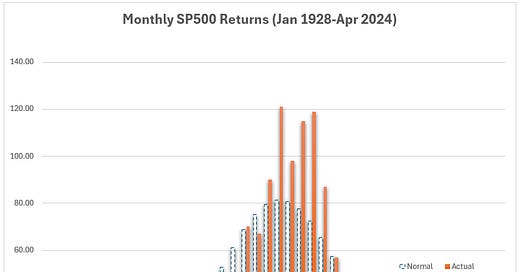Friends,
When a friend asks me what I think of investing in the SP500 I have a standard answer:
It’s a broad basket diversified across industries including foreign revenue via multinationals. If the economy grows and companies make profits in the long run you should do fine.
The next question is inevitably “what percentage of my investable assets should I put in it?”
The quick answer is that custom is not a bad guide. If you don’t want to do any work 60/40 is a reasonable weighting or you can follow the glide path of a target-date fund. Ed Thorp admits he puts all his money in the index because that’s the recipe for the highest long term return. But he’s also admits that if he suffered a 90% drawdown he still has more money than or his heirs ever need. Most of us would be injured if the market swept the leg right before we retired.
So while 60/40 or age-based weight is a good starting point if you know nothing, most people who care enough to ask “how much should I put?” don’t know nothing. They know their life circumstances. They probably have goals. And concerns. For some goals loom larger than concerns in their minds. For others it’s the opposite. Both types of people find that the balance of these considerations makes them a candidate for a non-standard answer.
Of course you don’t just go full dominatrix and say “I heard what you need, now do THIS”. You let them own their decisions by laying out the proposition and letting them come to a conclusion. This is how I describe the proposition of investing in the SP500 or broad index:
It’s a box that has historically paid about 9% per year with a standard deviation of about 19%. The sharpe ratio has been close to .50. Under that hood, you have negative skew and fat-tails which means you are getting paid to hang on through some scary turbulence.
[A more granular answer would say something like “you earn the risk-free rate + 3 to 6%”]
They’ll ask if that performance will continue. I’ll die a little inside because the presumption is they think someone could know. Any answer is merely epistemic icing on a layer cake of conditional probabilities emanating from whether humanity will self-destruct. But ruining your Thursday was not on my to-do list so I play along:
“You see, it depends on whether you think there’s something persistent about the last 40 years that padded those hundred year stats. Have you wondered if the fact that companies stay private for longer matters for future returns? I mean it was kinda cool that Gates, Jobs, Bezos, Zuck, Brin, and Page had the public as their LPs during their massive growth phases. Not sure if they started their companies today if that would happen. On the other hand, the GFC marked the end of defined benefits for private companies in exchange for defined contribution. If the stock market is now the new social security I can see the political argument for not only a Fed put but a permanent federal jobs program.
You know, I have this saying that markets are biology not phys— um, hello…oh…at what point did I cut out, ahhh, sorry, go ahead…no, no, it’s ok, really go ahead, you should never be to a late cat seance”
You get the idea. Any discussion of the future has speculative errors bars that pale against the tyranny of circumstance. I’ve always appreciated the humility behind my buddy Nick Maggiulli’s observation that if you had invested from 1960-1980 and beaten the market by 5% each year, you would have made less money than if you had invested from 1980-2000 and underperformed the market by 5% a year. May your capital appreciation years coincide with economic growth where you live. Deciding to invest is a faith-based exercise before anything. Reminds me of a riddle:
If you have 3 of me, you have 3.
If you have 2, you have 2.
If you have 1, you have 0.
What am I?1
Discussing the future with me is nothing but entertainment.
What I can help with is deconstruct the properties of historical proposition that the SP500 offered and pull out a bunch of interesting lessons. If the world carries on, they’ll be useful context for considering how much to invest. But I’d bet you’ll learn a lot more than that.
Let’s roll.




